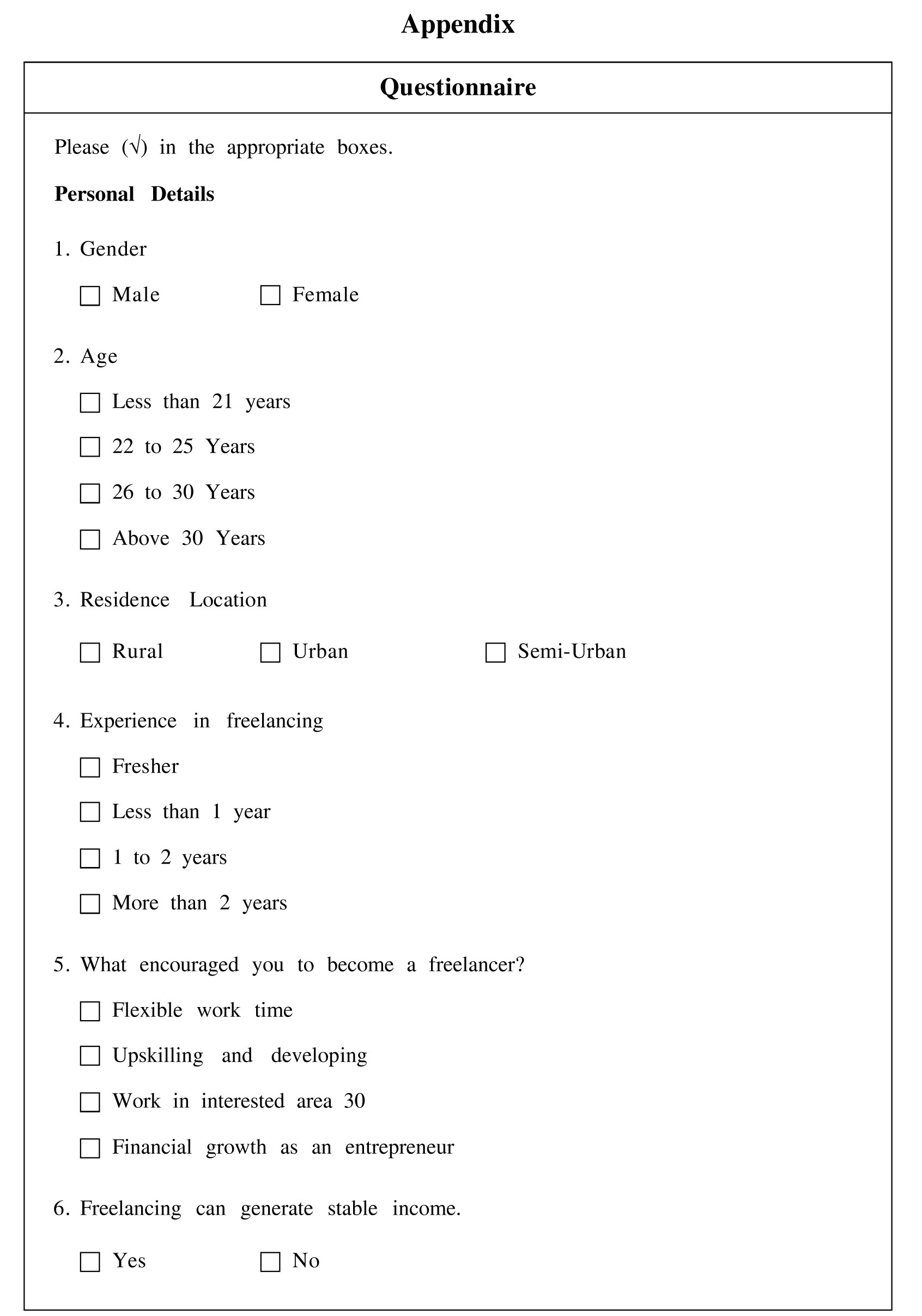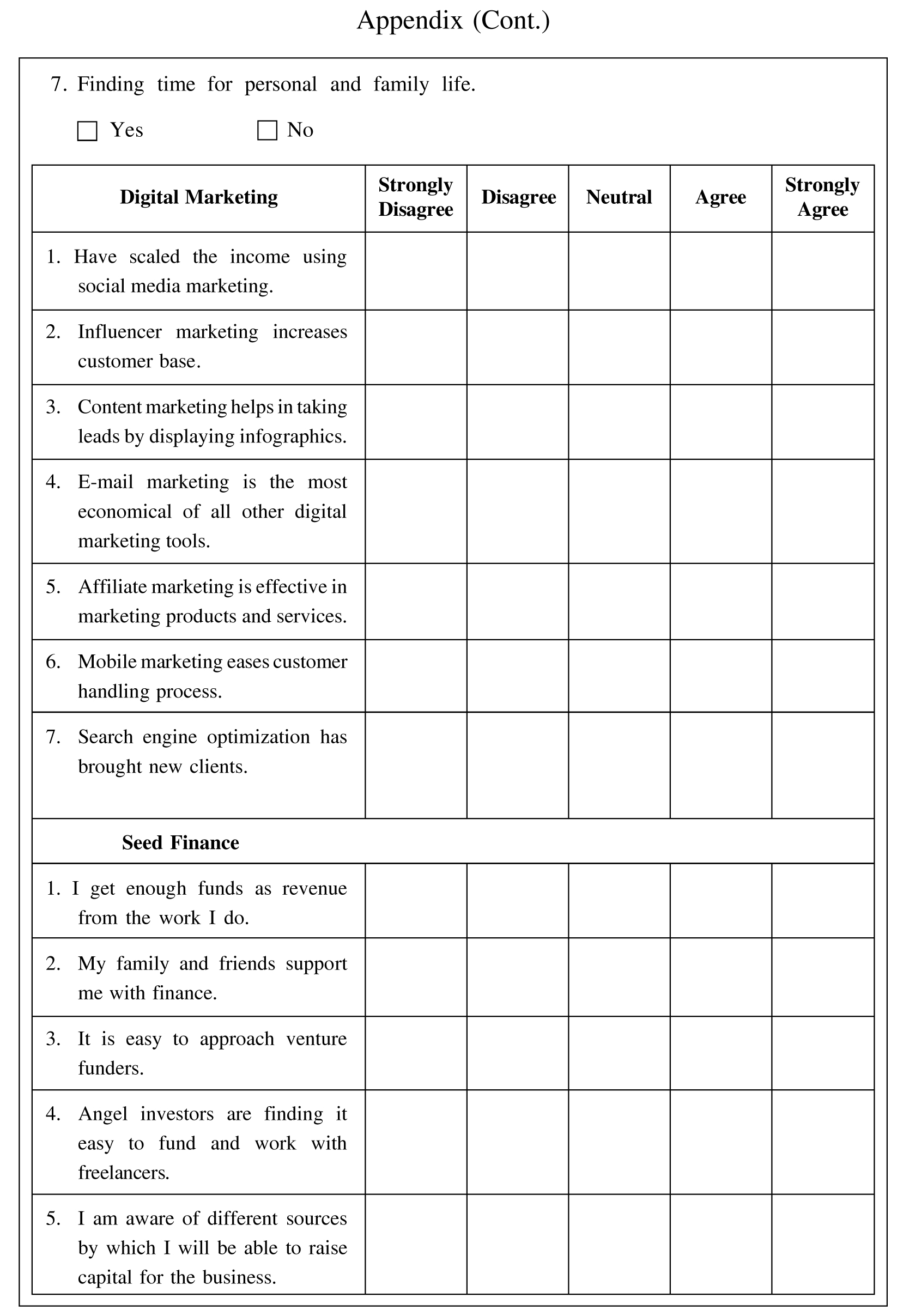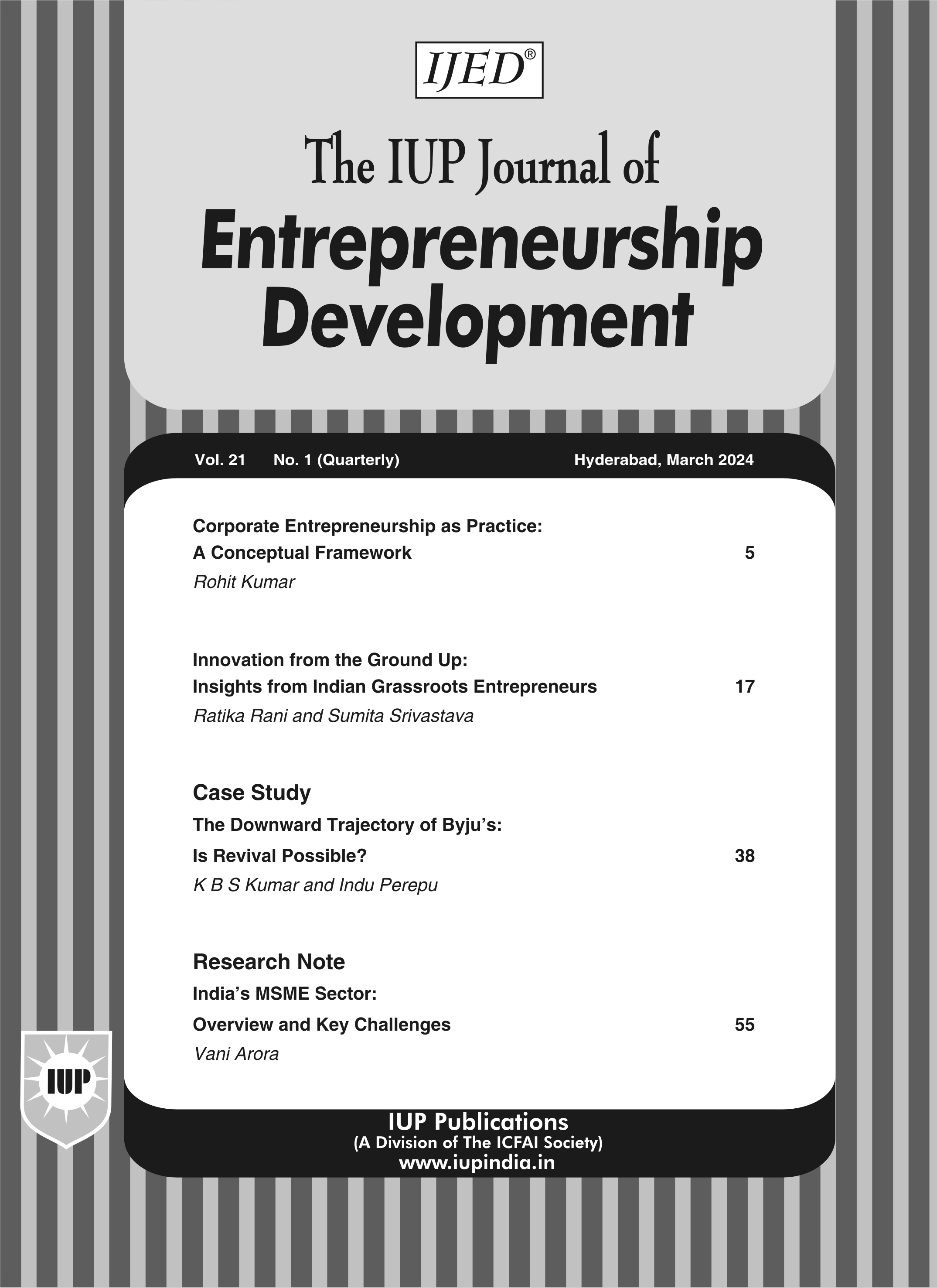
Dec'23
The IUP Journal of Entrepreneurship Development
Archives
Gig Economy and Entrepreneurship: A Study on Digital Marketing, Seed Financing and Freelancers' Satisfaction
Naveen Kumar R
Assistant Professor, School of Management, Kristu Jayanti College (Autonomous), Bengaluru, Karnataka,
India; and is the corresponding author. E-mail: naveen.austin@gmail.com
Janani M
Assistant Professor, Department of Professional Accounting & Finance, Kristu Jayanti College (Autonomous),
Bengaluru, Karnataka, India. E-mail: jananimylswamy97@gmail.com
A John William
Assistant Professor, School of Management, Kristu Jayanti College (Autonomous), Bengaluru, Karnataka,
India. E-mail: william.aj@kristujayanti.com
Muthu Kumar T
Professor, Xavier Institute of Management & Entrepreneurship, Bengaluru, Karnataka, India.
E-mail: tmkumar13@yahoo.co.in
India's gig economy professionals often transition into successful startups, attracting seed funding for growth. Their success is attributed to their expertise, niche focus, market relevance, local insights, adaptability, innovation, networking, government support, scalable business models, and effective pitching skills. The journey from gig economy worker to startup success in India is marked by a blend of digital marketing acumen, adaptability, and understanding of local market dynamics. This study analyzes data from 232 freelancers who have applied for seed funding to have startups in Tamil Nadu, assessing their expectations and satisfaction levels. The study uses Confirmatory Factor Analysis, AVE, HTMT, and SEM to examine the relationships between digital marketing, seed financing, and freelancers' satisfaction. The study result shows that the freelancers are satisfied with their work as they get work flexibility and timing, and it is also found that when seed financing is made available to these freelancers, they could build their own startup and provide employment opportunity to others.
Introduction
India's gig economy is expected to grow to 23.5 million workers by 2029-30, with the demand for freelancers increasing. The gig sector is expected to grow to $455 bn at a CAGR of 17% by 2024, with the potential to grow two times the pre-pandemic estimates (Pramshu, 2022). The Covid-19 pandemic has disrupted the labor market, leading to a shift in work culture and gig economy. The gig economy offers flexibility, competitive payouts, a variety of projects, and autonomy, making it a leading choice for the young working populace. However, the gig economy faces challenges, such as mistreatment, low salaries, and bureaucratic delays in policy implementation. To address these issues, fine-tuning labor laws and social security rules, constant upskilling opportunities, and technological empowerment for gig workers are necessary. The gig economy is being touted as the new working-class norm, but challenges such as mistreatment, low salaries, and bureaucratic delays need to be addressed. It is setting a way out for the gig workers to have their startups by receiving funds from the seed funders to raise their business ideas, and these freelancers work in any possible working condition to improve the business; they make all the enhancement from the places where they work from (Dufva et al., 2017). Successful platforms like Airbnb and Uber demonstrate the platform economy, requiring rethinking of strategies and business models, and posing new challenges for regulators and markets (Smola and Sutton, 2002; Hershatter and Epstein, 2010; and Kauffman, 2015). Individuals desire higher salaries, job security, entrepreneurship, entrepreneurial training, and frequent job changes, contradicting their motivations for entering the gig economy (Sundararajan, 2014; and Burtch et al., 2016). This strategy can boost economic growth and welfare by increasing workforce productivity, stimulating consumption, and enhancing innovation and entrepreneurship. As outlined by Healy et al. (2017), platforms are proprietary applications that enable users to download and use, fostering a novel business concept where producers and end-users can exchange goods/services through digital intermediaries (Kenney and Zysman, 2015). Digital platforms like Google, Facebook, Amazon Web Services, and Uber are transforming the economy by generating value and reorganizing sectors. Korhonen et al. (2017) explores how startups use digital platforms to facilitate the connection between producers and users, and the potential for acquiring value from these core interactions.
The gig economy in India presents challenges for gig workers, including gender discrepancies and lack of frameworks and governmental support. These self-employed or micro-entrepreneurs are not entitled for traditional jobs and face legal tangles and conflicts. Companies must ensure due diligence in selecting gig jobs while ensuring privacy, cost, and optimization of resources. The gig economy has impacted various industries, particularly the digital marketing sector, requiring sustainable frameworks to support gig-based enterprises. The study explores the journey of gig economy professionals from gig workers to founders of successful startups, driven by expertise, innovation, and government support. The gig economy contributes significantly to GDP, tax revenues, employment, and domestic and export earnings.
Literature Review
According to Wasnik and Jain (2023), gig economy professionals in India's startups thrive due to expertise, innovation, and government support, with the Indian government fostering the ecosystem through funding initiatives and support programs. According to Vatsa et al. (2022), the gig economy's sustained growth has significantly contributed to the self-reliance of Indian economy. Kshetri (2017) opined that the shift towards a market-oriented system and policy objectives to become a business-friendly economy that has fostered a favorable environment for startups. Singh (2020) was of the view that the 'Startup India' initiative has significantly contributed to fostering a startup culture by offering support in areas like simplification, funding, and incubation. According to Green (2018), Upwork.com is significantly boosting the growth of small businesses, entrepreneurs, and freelancers by offering various opportunities. Donovan et al. (2016) held that the gig economy, which involves short-term contract jobs and temporary positions, has significant implications for workers, consumers, and society as a whole (Donovan et al., 2016).
The gig economy, facilitated by digital platforms, offers short-term, flexible work arrangements, impacting product development, labor relations, and economic models (Bunders et al., 2022). The gig economy encompasses all digital or remote work professions, involving employers and employees meeting online to complete specific tasks (Friedman, 2014; Ashford et al., 2018; and Kuhn and Galloway, 2019). However, there are also risks and challenges, as the self-employed "gig workers" will have to compete in a larger, more competitive labor market to be successful (Friedman, 2014; and Kuhn, 2016). The IT field is significantly influenced by technology, as it plays a crucial role in mediating gig work, where workers organize their work through digital platforms (Todoli-Signes, 2017). The gig economy, originating from musicians performing shows, now encompasses various employment relationship in various sectors like coffee shops, factories, food delivery services, cab drivers, and more (Kuhn and Maleki, 2017). Self-employed individuals work directly for the labor market or offer services to companies without joining them. However, gig economy workers, who coordinate tasks through digital platforms, fit more into the self-employed category and less into traditional permanent contracts (Burkus, 2021).
Digital labor platforms are increasingly employing individuals who do not fit into the traditional notion of independent contractors or self-employed (Koutsimpogiorgos et al., 2019). Digital media enables innovative companies to develop a new market model, the "gig economy," involving peer-to-peer platforms for paid tasks or rented goods (Stewart and Stanford, 2017). The gig economy offers flexible working patterns; workers own their workspaces, tasks are performed online, and a triangular relationship exists between the employee, end-user, and digital intermediary.
Problem Statement
The growth of the Indian gig economy into successful startups, securing seed funding for sustainable development, is propelled by factors such as expertise, niche focus, market relevance, local insights, adaptability, innovation, networking, government support, a proven track record, scalable business models, and effective pitching skills. Notably, there is a limited body of research exploring gig economy startup ideas and their experiences in obtaining seed funding. This study seeks to bridge this gap by investigating the role of expertise and innovation, local insights and market customization, government support, a proven track record, and the effectiveness of pitching skills in the context of securing seed funding. Through a comprehensive analysis, the study seeks to offer insights into the dynamic landscape of entrepreneurial success among gig economy professionals and the appeal of their ventures for seed funding throughout their journey.
Research Gap
The gig economy, a rapidly growing sector in the digital marketing sphere, is gaining momentum due to the role of seed funding. However, there is a lack of comprehensive research on the relationship between digital marketing, seed financing, and freelancers' satisfaction. Available research highlights the importance of various digital marketing subdomains, but lacks a comprehensive analysis of their impact on freelancers' satisfaction. Additionally, there is a need for robust support system to foster the growth and sustainability of gig-based enterprises. This study aims to fill these gaps by providing a comprehensive analysis of these relationships.
Hypothesis Formulation
The study has formulated the following hypotheses (Figure 1):
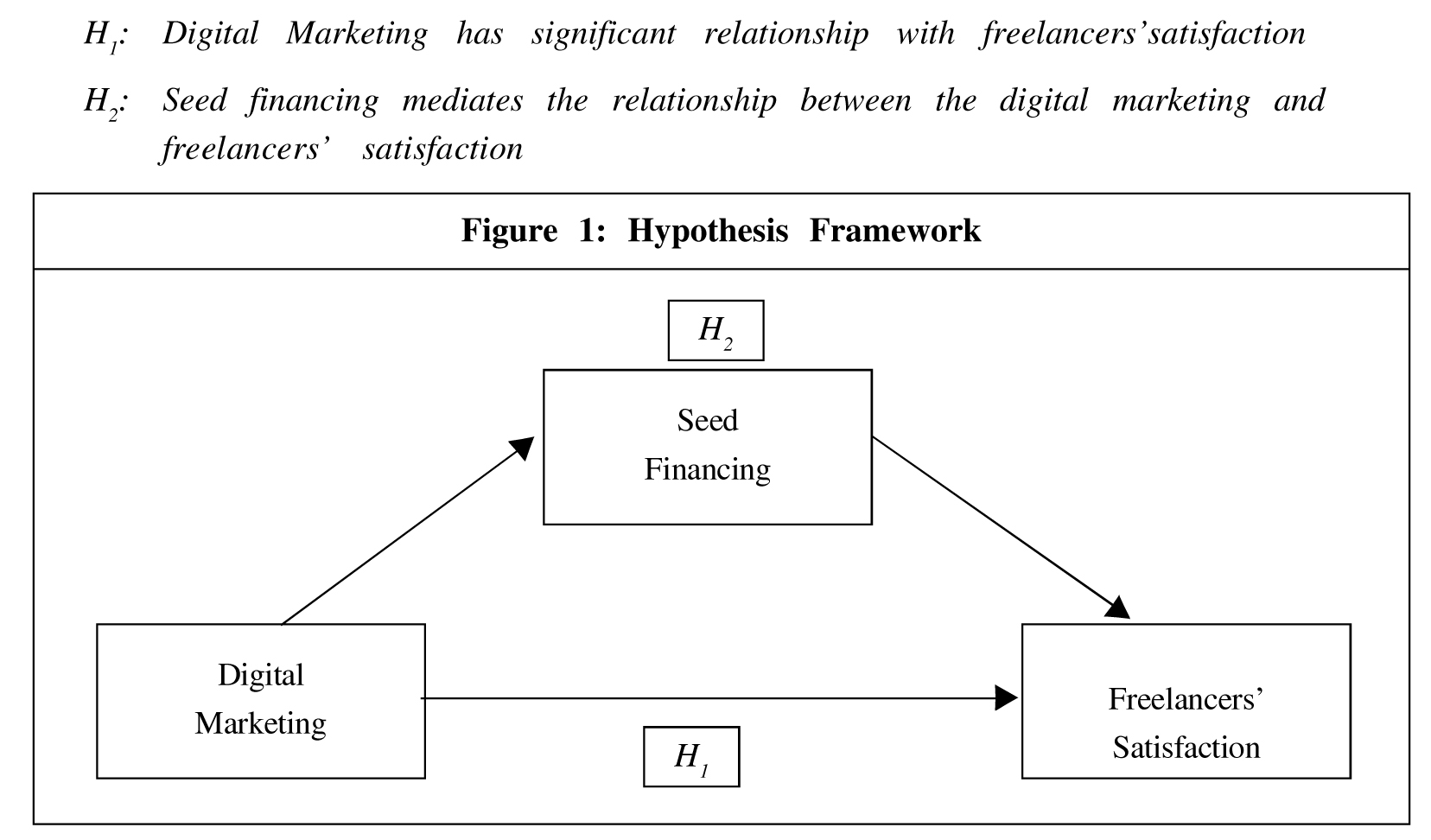
Objective
The study aims to explore the relationship between digital marketing, seed financing, and freelancers' satisfaction in the rapidly growing gig economy.
Conceptual Model
The review of literature in the field of gig economy is limited, and thus the gig economy could not be defined in clear concepts (Donovan et al., 2016). The data related to gig economy workers are scarce, and available data does not represent the whole gig economy. The Indian gig economy is surviving by the expertise they pose, innovation and the government support. The conceptual framework displays that the usage of digital marketing by the freelancers help them to improve their satisfaction and the availability of seed financing mediates the relationship between digital marketing and freelancers' satisfaction.
Methodology
For the study, the sample was drawn from a diverse pool of gig economy workers as respondents representing various startup initiations in Tamil Nadu. Availability sampling is a non-probability sampling method where participants are chosen based on their availability and readiness to participate in a study. The respondents should have startup experience and active participation as freelancers in the industry. To better understand the topic at hand, a descriptive survey was used as the backbone of the study. A questionnaire is a common research instrument used to collect data from the study population. An individual's demographic information (such as gender, age, employment, level of education, and company type) is collected in the survey's initial section. Questions about the study's dependent and independent variables make up the second section of the questionnaire. Digital Marketing is measured with questions relating to scaling of business, influencer marketing, content marketing, e-mail marketing, affiliate marketing, mobile marketing and search engine optimization. Seed financing is measured with questions relating to revenue, support, funding and awareness on source of funding. Freelancers' satisfaction is measured with questions relating to career, client, dedication, skill development and overall satisfaction.
All responses were collected using a five-point Likert scale, with 1 indicating strongly disagree and 5 indicating strongly agree (see Appendix). The study was conducted from August 2023 to November 2023. The purpose of descriptive statistics is to provide a concise overview of a study by tabulating and presenting summary statistics such as the mean and standard deviation of the study's variables. Cronbach's alpha was used to determine the data's credibility. Structural equation modeling (SEM) was used for hypothesis testing.
Data Analysis
Confirmatory factor analysis (CFA) confirmed constructs' reliability, while SEM analysis examined the relationship among digital marketing, seed financing, and freelancers' satisfaction. The study considered various digital marketing platform components, including social media, influencer marketing, content marketing, e-mail marketing, affiliate marketing, mobile marketing, and search engine optimization.
The adequacy of sample to carry out the SEM analysis was checked through KMO and Bartlett's Test of Sphericity that display the sampling adequacy (Table 1). KMO value (> 0.5) (Kaiser, 1974) and Bartlett's Test of Sphericity p-value (< 0.05), (Field, 2005). The values indicates sample adequacy for further analysis.
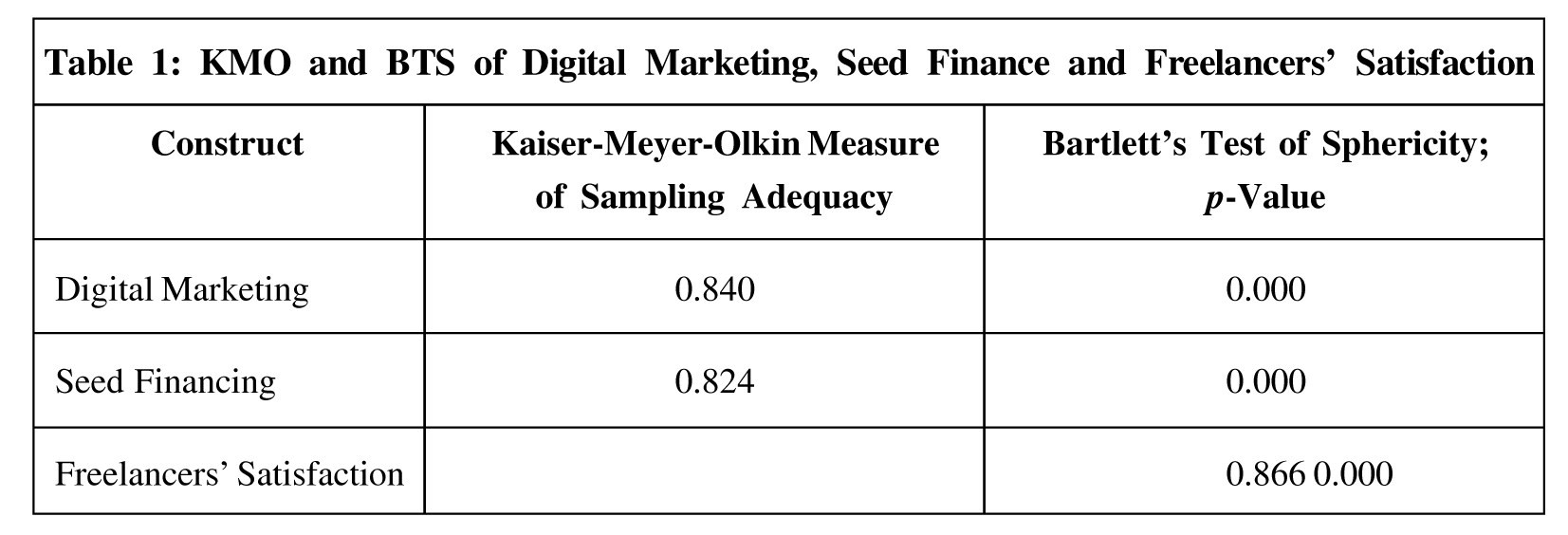
Exploratory Factor Analysis
Table 2 displays communalities with values exceeding 0.5, as per the criteria outlined by Field (2005). Furthermore, the factor loadings also fall within acceptable range, surpassing 0.5, as indicated by Janssens et al. (2008). Cronbach's alpha coefficients for the constructs are 0.820 for digital marketing, 0.838 for seed financing, and 0.899 for freelancers' satisfaction, all of which surpass the recommended threshold of 0.60 (Janssens et al., 2008). Additionally, the total variance explained exceeds 60%, aligning with the acceptable range, as described by Hair et al. (2009). All the items considered in the analysis exhibit factor loadings greater than 0.5, thus justifying their inclusion in the construct.
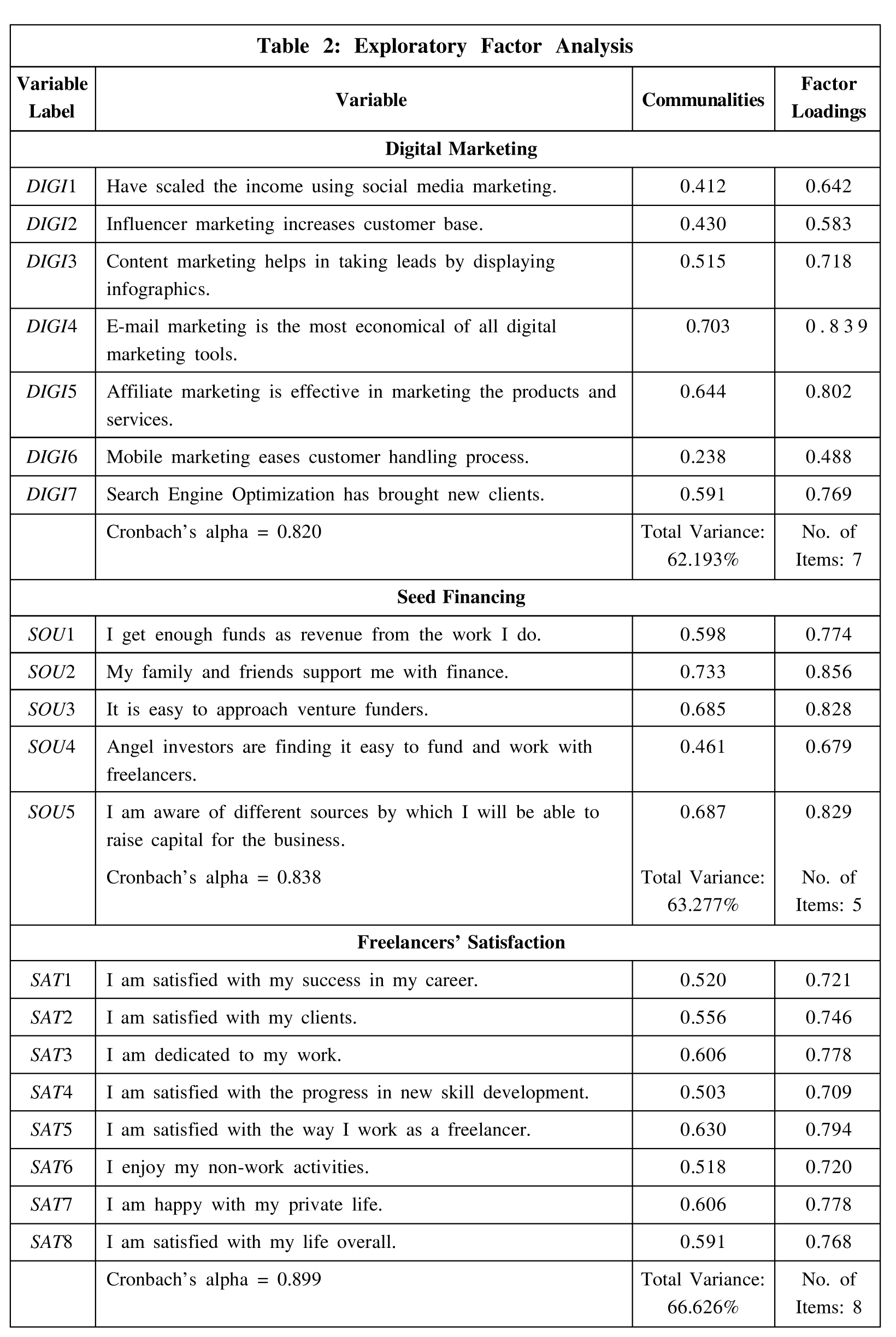
Confirmatory Factor Analysis Confirmatory factor analysis (CFA) was conducted using AMOS to evaluate the measurement model. During CFA, an assessment of factor loadings was performed, and no items were excluded from the analysis as all items exhibited factor loadings exceeding 0.40 (Table 3). The overall goodness of fit for the model was evaluated using several measures, including CMIN/df, GFI, CFI, TLI, RMSEA and SRMR, as recommended by Hu and Bentler (1998). The model-fit measures indicated satisfactory goodness of fit for all constructs, with a CMIN/df value of 2.32, a CFI value of 0.952, an IFI value of 0.953, a TLI value of 0.938, an RMSEA of 0.73, and an SRMR value of 0.040, all of which fell within the specified acceptable limits.
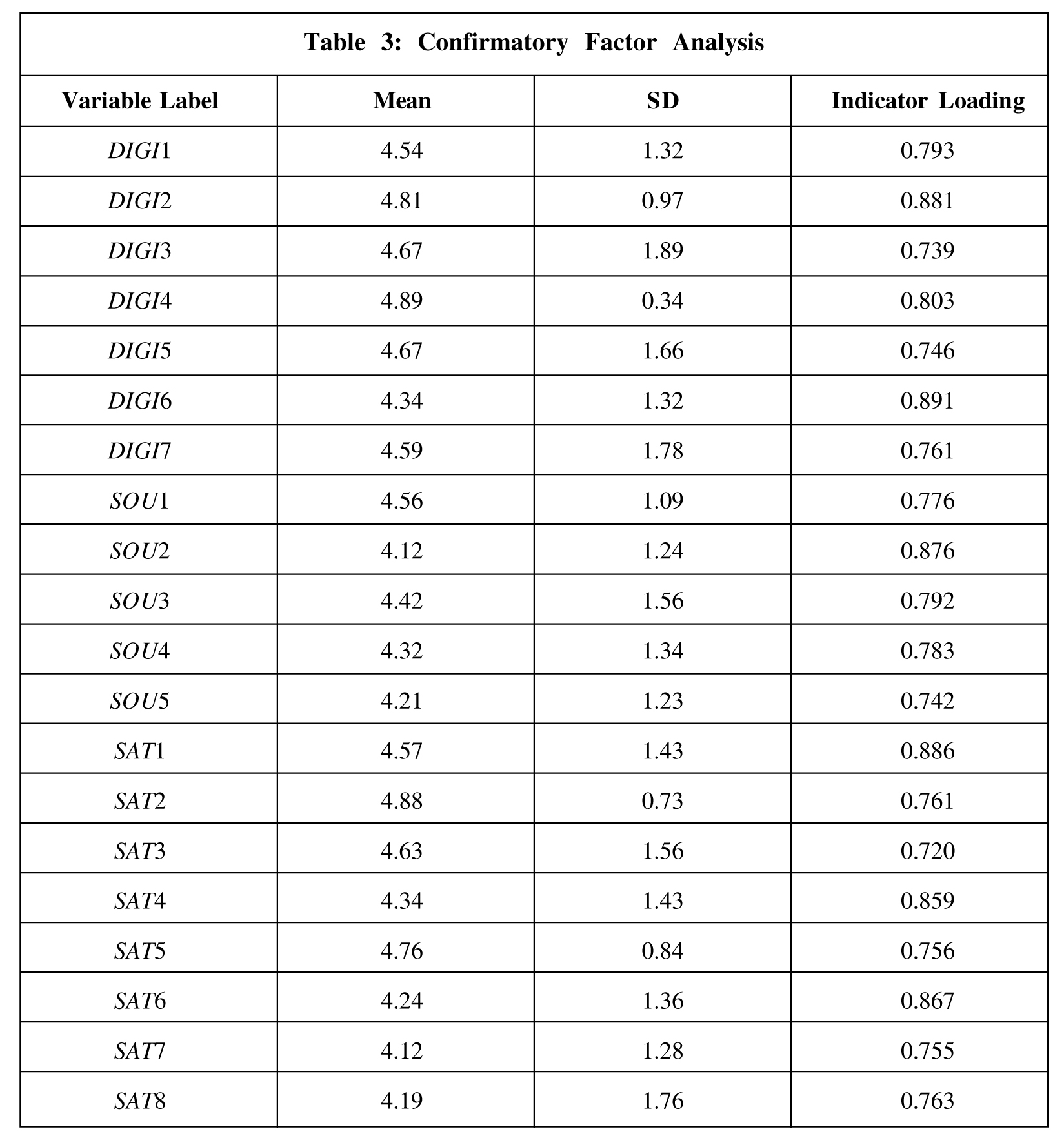
Composite reliability, based on factor loadings, was assessed to gauge the constructs' reliability (Table 4). Nunnally and Bernstein (1994) recommend a benchmark of 0.7 for composite reliability. In this study, digital marketing scored 0.786, seed financing achieved 0.738, and freelancers' satisfaction attained 0.843, meeting the reliability requirement.
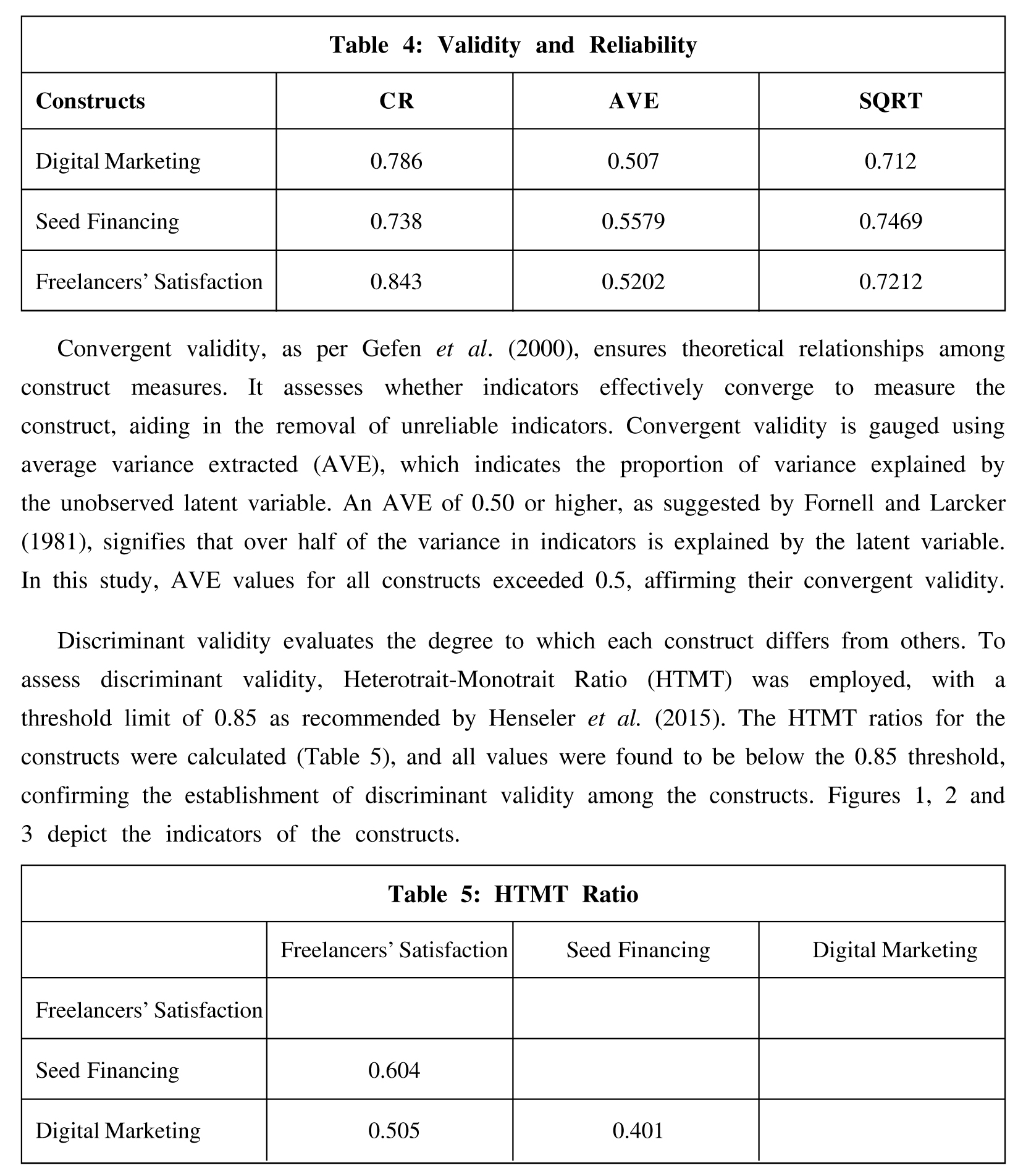
Indicators of the Constructs
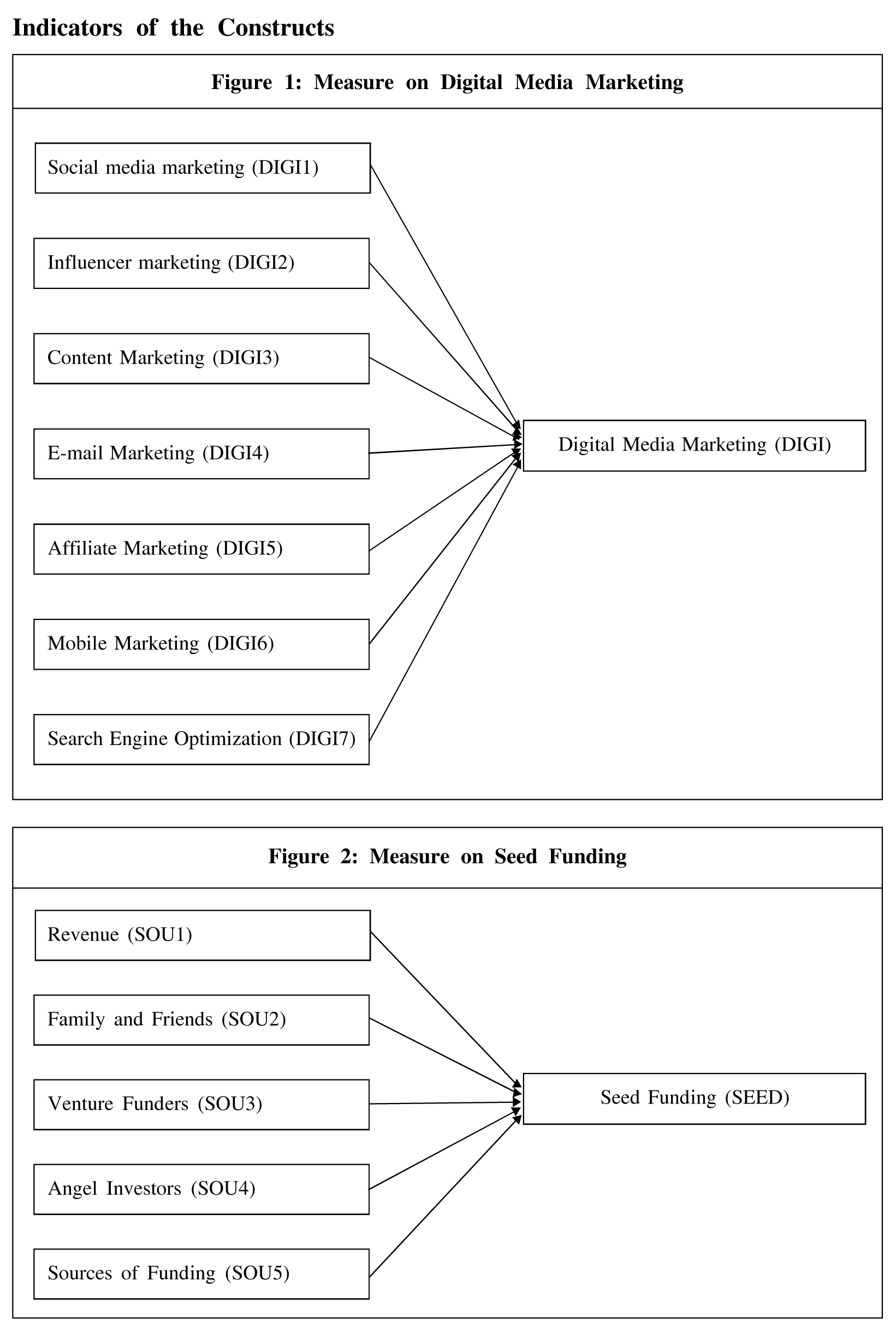
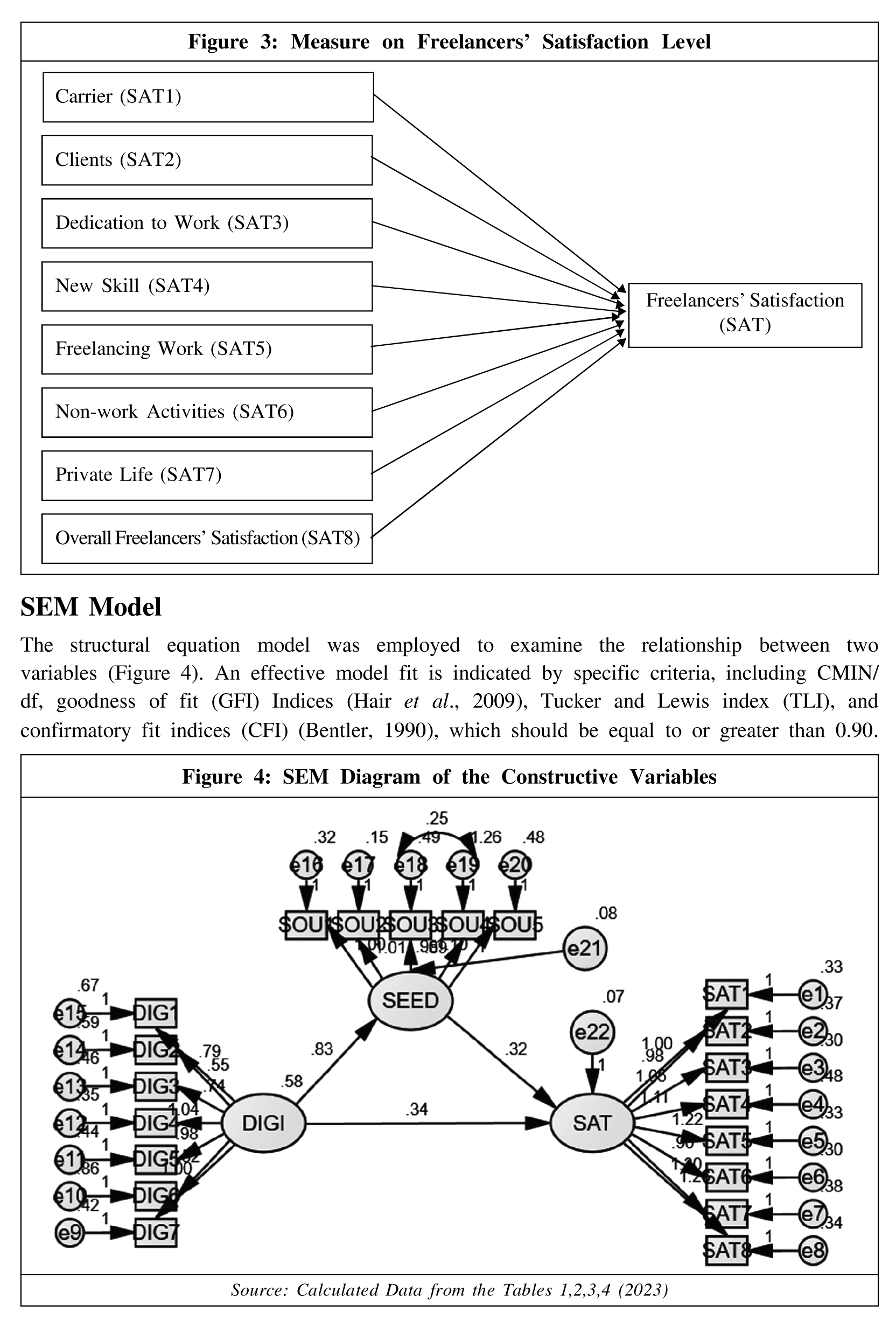
Additionally, the root mean square error approximation (RMSEA) should fall between 0.05 and 0.08, and the standardized root mean square residual (RMR) should be less than 0.05. Assessment of the model's fit index reveals that all values fall within acceptable range, with CMIN/df = 2.63, GFI = 0.952, IFI = 0.961, TLI = 0.941, CFI = 0.946, RMSEA = 0.074, and SRMR = 0.0452.
The findings (Table 6) reveal that digital marketing exerts a notable indirect impact on freelancers' satisfaction by way of seed funding, with an indirect effect size of 0.256. Moreover, a significant association exists between digital marketing and freelancers' satisfaction (p = 0.003, p < 0.001), thereby supporting H1. This suggests that digital marketing's influence on freelancers' satisfaction is partially mediated by the presence of seed financing construct.
The SEM analysis results also show a significant indirect effect of digital marketing on the freelancers' satisfaction, which is positive and significant (b = 0.256, t = 6.57, p = 0.021), supporting H2. In addition to this, the direct effect of digital marketing on seed financing in the presence of mediator is also found to be significant (b = 0.189, p = 0.003). Hence, seed financing partially mediates the relationship between digital marketing and freelancers' satisfaction.
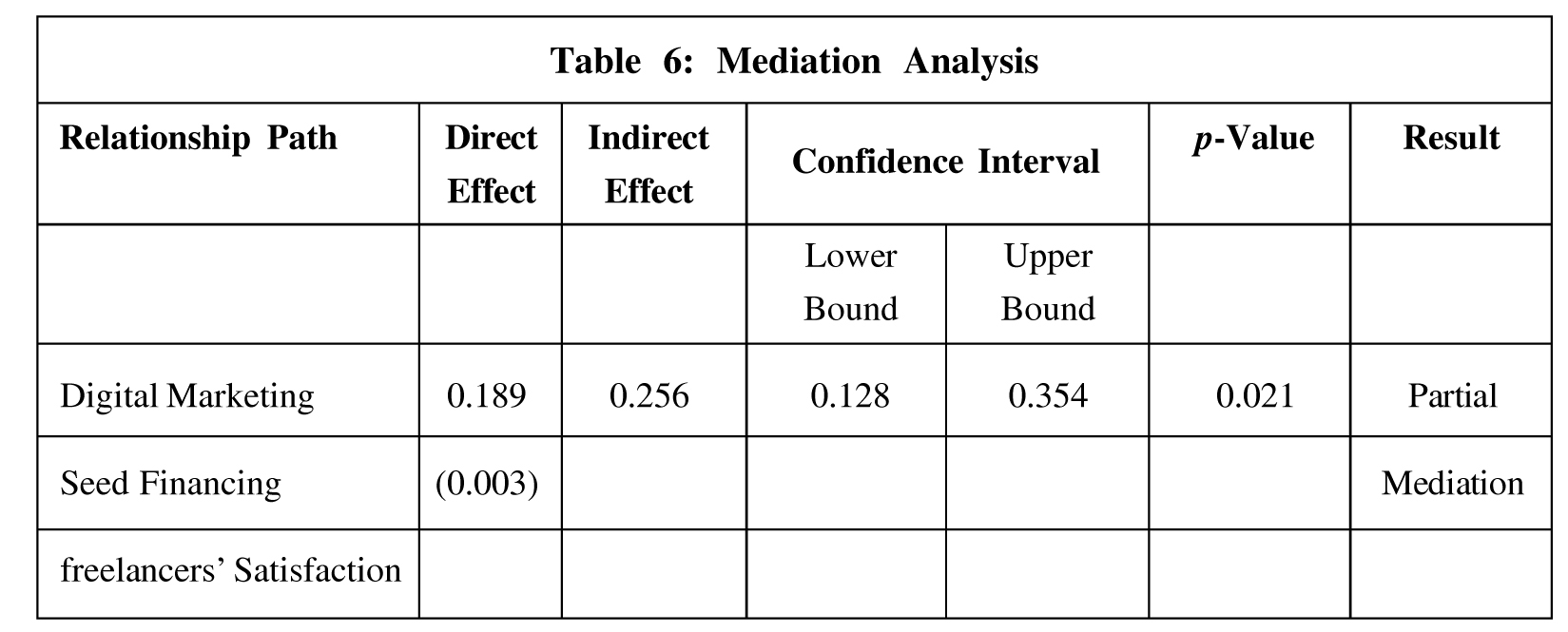
Results and Discussion
The study examined the challenges faced by freelancers in turning their work into a startup, including work regularity, income flow, recognition, and ecosystem issues. It also explored the challenges of starting a startup, including the lack of seed funding, reasons for non-availability, and lack of proofs with freelancers. The study aimed to address these issues by providing information on alternative sources of funding, promoting growth of businesses, and ensuring freelancers' satisfaction with the process. It also highlighted the impact of funds on business growth, highlighting the importance of securing funding for sustainability and expansion. The results showed that digital marketing indirectly influences freelancers' satisfaction through seed financing, with a significant indirect effect size of 0.256. The study also found a significant direct relationship between digital marketing and freelancers' satisfaction, suggesting that the presence of seed financing partially mediates the relationship between digital marketing and freelancers' satisfaction.
The study further analyzed freelancers' satisfaction when transitioning from freelancing to startups using structural equation modeling (SEM). The results show a significant indirect effect of digital marketing on freelancers' satisfaction. Seed financing partially mediates the relationship between digital marketing and freelancers' satisfaction. The study, hence, emphasizes the importance of financial resources, awareness of alternative funding options, and strategic use of digital marketing for successful transitions.
Conclusion
The study explored the relationship between digital marketing, seed financing, and freelancers' satisfaction. The study found that digital marketing indirectly impacts freelancers' satisfaction through seed financing, highlighting the interconnectedness between these variables. Digital marketing also positively impacts freelancers' satisfaction and professional success, enhancing their credibility. The study, hence, emphasizes the importance of incorporating digital marketing practices into freelancers' professional toolkit to navigate the competitive digital economy. The study validates the empirical relationship between digital marketing, seed financing, and freelancers' satisfaction, and emphasizes the strategic significance of embracing digital marketing strategies.
Limitations and Future Scope: The study is limited to the respondents of Tamil Nadu, and thus the results could not be generalized, the data collected is cross-sectional. Only limited factors such as digital marketing adoption by freelancers, seed financing and freelancer's satisfaction is studied.
The study results shows a positive impact of seed financing to the freelancers and their satisfaction. It can be further elevated in measuring the factors that impact the availability of seed financing to the freelancers, problems that are faced by the freelancers in sourcing funds for the business. Difference in the availability of funds between male and female freelancers could also be studied. Future researchers could focus on the factors contributing for the success of the freelancers can also be studied.
References
- Ashford S J, Caza B B and Reid EM (2018), "From Surviving to Thriving in the Gig Economy: A Research Agenda for Individuals in the New World of Work", Research in Organizational Behavior, Vol. 38, pp. 23-41. Doi: 10.1016/J.Riob.2018.11.001
- Bentler P M (1990), "Comparative Fit Indexes in Structural Models", Psychological Bulletin, Vol. 107, No. 2, pp. 238-246. https://doi.org/10.1037/0033-2909.107.2.238
- Bunders D J, Arets M, Frenken K and De Moor T (2022), "The Feasibility of Platform Cooperatives in the Gig Economy", Journal of Co-operative Organization and Management, Vol. 10, No. 1, 100167. https://doi.org/10.1016/j.jcom.2022.100167
- Burkus D (2021), Leading from Anywhere: The Essential Guide to Managing Remote Teams, Houghton Mifflin, Boston, Ma.
- Burtch G, Carnahan S and Greenwood B N (2016), "Can You Gig It? An Empirical Examination of the Gig Economy and Entrepreneurial Activity", Ross School of Business Paper No. 1308. Accessed on November 17, 2017. Http://Gkmc.Utah.Edu
- Donovan Sarah A, Bradley David H and Shimabukuru Jon O (2016), "What Does the Gig Economy Mean for Workers", Congressional Research Service Report.
- Dufva M, Koivisto R, Ilmola-Sheppard L and Junno S (2017), "Anticipating Alternative Futures for the Platform Economy", Technology Innovation Management Review, Vol. 7, No. 9, pp. 6-16.
- Field A (2005), Factor Analysis Using SPSS, SAGE Publications, London, UK.
- Fornell C and Larcker D F (1981), "Evaluating Structural Equation Models with Unobservable Variables and Measurement Error", Journal of Marketing Research, Vol. 18, No. 1, pp. 39-50. https://doi.org/10.1177/002224378101800104
- Friedman G (2014), "Workers Without Employers: Shadow Corporations and the Rise of the Gig Economy", Review of Keynesian Economics, Vol. 2, No. 2, pp. 171-188. Doi: 10.4337/Roke.2014.02.03
- Gefen D, Straub D and Boudreau M C (2000), "Structural Equation Modeling and Regression: Guidelines for Research Practice", Communications of the Association for Information Systems, Vol. 4, No. 1, pp. 1-78. https://doi.org/10.17705/1CAIS.00407
- Green Daryl D (2018), "Fueling the Gig Economy: A Case Study Evaluation of Upwork.Com", Https://Doi.Org/10.18639/Merj.2018.04.523634
- Hair J F, Black W C, Babin B J and Anderson R E (2009), Multivariate Data Analysis, 7th Edition, Pearson.
- Healy J, Nicholson D and Pekarek A (2017), "Should We Take the Gig Economy Seriously?", Labour and Industry: A Journal of the Social and Economic Relations of Work, Vol. 27, No. 3, pp. 232-248.
- Henseler J, Ringle C and Sarstedt M (2015), "A New Criterion for Assessing Discriminant Validity in Variance-based Structural Equation Modeling", Journal of the Academy of Marketing Science, Vol. 43, pp. 115-135. https://doi.org/10.1007/s11747-014-0403-8
- Hershatter A and Epstein M (2010), "Millennials and the World of Work: An Organization and Management Perspective", Journal of Business and Psychology, Vol. 25, No. 2, pp. 211-223. Http://0-Www.Jstor.Org.Wam.Leeds.Ac.Uk
- Hu L and Bentler P M (1998), "Fit Indices in Covariance Structure Modeling: Sensitivity to Underparameterized Model Misspecification", Psychological Methods, Vol. 3, pp. 424-453. https://doi.org/10.1037/1082-989X.3.4.424
- Janssens W, De Pelsmacker P, Wijnen K and Van Kenhove P (2008), Marketing Research with SPSS, Pearson Education, New York, USA.
- Kauffman (2015), "The Future of Entrepreneurship: Millennials and Boomers Chart the Course for 2020", The Foundation of Entrepreneurship. Accessed on February 2, 2018. Https://Www.Kauffman.Org
- Kaiser H F (1974), "An Index of Factorial Simplicity", Psychometrika, Vol. 39, No. 1, pp. 31-36. https://doi.org/10.1007/BF02291575
- Kenney M and Zysman J (2015), "Choosing a Future in the Platform Economy: The Implications and Consequences of Digital Platforms", in Kauffman Foundation New Entrepreneurial Growth Conference,
- Korhonen H M, Still K, Seppanen M et al. (2017), "The Core Interaction of Platforms: How Startups Connect Users and Producers", Technology Innovation Management Review, Vol. 7, No. 9, pp. 17-29.
- Koutsimpogiorgos N, Van Slageren J, Herrmann A and Frenken K (2019), "Conceptualizing the Gig Economy and Its Regulatory Problems", Policy & Internet, Vol. 12, No. 4, pp. 525-545. Https://Doi.Org/10.1002/Poi3.237
- Kuhn K M (2016), "The Rise of the 'Gig Economy' and Implications for Understanding Work and Workers", Industrial and Organizational Psychology, Vol. 9, No. 1, pp. 157-162. Doi: 10.1017/Iop.2015.129
- Kuhn K M and Galloway T L (2019), "Expanding Perspectives on Gig Work and Gig Workers", Journal of Managerial Psychology, Vol. 34, No. 4, pp. 186-191. Doi: 10.1108/Jmp-05-2019-507
- Kuhn K M and Maleki A (2017), "Micro-Entrepreneurs, Dependent Contractors, and Instaserfs: Understanding Online Labor Platform Workforces", Academy of Management Perspectives, Vol. 31, No. 3, pp. 183-200. Doi: 10.5465/Amp.2015.0111
- Kshetri N (2017), "Fostering Startup Ecosystems in India", Asian Research Policy, Vol. 7, No. 1, pp. 94-103.
- Nunnally J C and Bernstein I H (1994), Psychometric Theory. 3rd Edition, McGraw Hill, New York.
- Ohira Susumu (2021), "Literature Review of the Gig Economy from a Product Development Perspective", Japan Marketing Journal, Vol. 40, No. 3, pp. 45-57. Https://Doi.Org/10.7222/Marketing.2021.006
- Pramshu (2022), "India's Gig Economy to have 23.5 million Workers by 2029-30": Niti Aayog. IndBiz | Economic Diplomacy Division, June 28. https://indbiz.gov.in/indias-gig-economy-to-have-23-5-million-workers-by-2029-30-niti-aayog/
- Singh Vijay Kumar (2020), "Policy and Regulatory Changes for a Successful Startup Revolution: Experiences from the Startup Action Plan in India", in Farhad Taghizadeh-Hesary, Naoyuki Yoshino, Chul Ju Kim, Peter J Morgan and Daehee Yoon (Eds.), Investment in Startups and Small Business Financing, Chapter 2, pp. 33-67, World Scientific Publishing Co. Pte. Ltd. Https://Doi.Org/10.2139/Ssrn.3635930
- Smola K W and Sutton C D (2002), "Generational Differences: Revisiting Generational Work Values for the New Millennium", Journal of Organizational Behavior, Vol. 23, No. 4, pp. 363-382. Accessed on January 29, 2018. Http://0- Onlinelibrary.Wiley.Com.Wam.Leeds.Ac.Uk
- Stewart A and Stanford J (2017), "Regulating Work in the Gig Economy: What are the Options?", The Economic and Labour Relations Review, Vol. 28, No. 3, pp. 420-437. Accessed on November 15, 2017. Http://0-Journals.Sagepub.Com. Wam.Leeds.Ac.Uk
- Sundararajan A (2014), "Peer-to-Peer Businesses and the Sharing (Collaborative) Economy: Overview, Economic Effects and Regulatory Issues". Accessed on November 14, 2017. Https://Smallbusiness.House.Gov
- Todoli-Signes A (2017), "The 'Gig Economy': Employee, Self-Employed or the Need for a Special Employment Regulation?", Transfer: European Review of Labour and Research, Vol. 23, No. 2, pp. 193-205. Doi: 10.1177/1024258917701381
- Vatsa Vidushi, Gupta Ruchika and Srivastava P (2022), "Sustaining India's Gig Economy in Industry 4.0, Advances in Finance, Accounting, and Economics", in Transitioning from Globalized to Localized and Self-Reliant Economies. https://Doi.Org/10.4018/978-1-7998-8705-8.Ch015
- Wasnik A P and Jain Abhinav (2023), "Government Support for Startups: A Comprehensive Analysis of Funding Initiatives and the Role of the Indian Government in Nurturing the Startup Ecosystem", Journal of Economics and Business, Vol. 6, No. 3. https://Doi.Org/10.31014/Aior.1992.06.03.523
